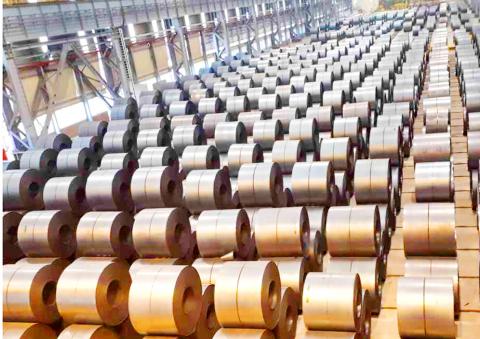Taiwan is to seek negotiations with the US on tariffs to be implemented on steel and aluminum imports into the US, in a bid to protect the interests of Taiwanese exporters, the Ministry of Economic Affairs (MOEA) said yesterday.
A statement issued by the Bureau of Foreign Trade on behalf of the ministry said that the ministry would closely watch measures announced by the White House on Thursday on the tariff issue and demand that Washington enter talks with Taipei.
In addition, the ministry said it would watch closely how other US trading partners react to the tariffs and would exchange views with them under WTO guidelines.

Photo courtesy of Formosa Plastics Group
US President Donald Trump signed an order under Section 232 of the Trade Expansion Act of 1962 on Thursday to impose a 25 percent tariff on imported steel and a 10 percent tariff on aluminum.
The duties are expected to take effect in 15 days.
It was the first time in more than three decades that the law has been invoked to implement measures to protect a domestic industry from competition by imports.
Trump’s move is perceived as less of an effort to preserve national security and more as an attempt to create a giant bargaining chip that he can use in negotiations with the US’ trading partners.
According to the order, Canada and Mexico have been temporarily exempted from the tariffs; if they want to avoid the duties permanently, they have to agree to US demands in the renegotiation of the North American Free Trade Agreement.
The order has also opened a door to other countries that want tariff waivers, as long as they offer the Office of the US Trade Representative satisfactory alternatives.
Trump announced the plan last week and the ministry warned that the tariffs would hurt free trade in the global market.
In response, the Taiwan Steel and Iron Industries Association (台灣區鋼鐵公會) yesterday urged the government and local exporters to work together to communicate with the US government to seek an exemption.
According to the ministry, Taiwan’s steel product exports to the US totaled US$1.3 billion last year, accounting for 13.16 percent of total steel exports, while Taiwan’s aluminum exports to the US totaled US$44 million, or 6.15 percent of total aluminum exports.
Last year, the US was the largest buyer of Taiwan’s steel products and the sixth-largest buyer of Taiwan’s aluminum products, the ministry said.

AGING: As of last month, people aged 65 or older accounted for 20.06 percent of the total population and the number of couples who got married fell by 18,685 from 2024 Taiwan has surpassed South Korea as the country least willing to have children, with an annual crude birthrate of 4.62 per 1,000 people, Ministry of the Interior data showed yesterday. The nation was previously ranked the second-lowest country in terms of total fertility rate, or the average number of children a woman has in her lifetime. However, South Korea’s fertility rate began to recover from 2023, with total fertility rate rising from 0.72 and estimated to reach 0.82 to 0.85 by last year, and the crude birthrate projected at 6.7 per 1,000 people. Japan’s crude birthrate was projected to fall below six,

Conflict with Taiwan could leave China with “massive economic disruption, catastrophic military losses, significant social unrest, and devastating sanctions,” a US think tank said in a report released on Monday. The German Marshall Fund released a report titled If China Attacks Taiwan: The Consequences for China of “Minor Conflict” and “Major War” Scenarios. The report details the “massive” economic, military, social and international costs to China in the event of a minor conflict or major war with Taiwan, estimating that the Chinese People’s Liberation Army (PLA) could sustain losses of more than half of its active-duty ground forces, including 100,000 troops. Understanding Chinese

SELF-DEFENSE: Tokyo has accelerated its spending goal and its defense minister said the nation needs to discuss whether it should develop nuclear-powered submarines China is ramping up objections to what it sees as Japan’s desire to acquire nuclear weapons, despite Tokyo’s longstanding renunciation of such arms, deepening another fissure in the two neighbors’ increasingly tense ties. In what appears to be a concerted effort, China’s foreign and defense ministries issued statements on Thursday condemning alleged remilitarism efforts by Tokyo. The remarks came as two of the country’s top think tanks jointly issued a 29-page report framing actions by “right-wing forces” in Japan as posing a “serious threat” to world peace. While that report did not define “right-wing forces,” the Chinese Ministry of Foreign Affairs was

US President Donald Trump in an interview with the New York Times published on Thursday said that “it’s up to” Chinese President Xi Jinping (習近平) what China does on Taiwan, but that he would be “very unhappy” with a change in the “status quo.” “He [Xi] considers it to be a part of China, and that’s up to him what he’s going to be doing, but I’ve expressed to him that I would be very unhappy if he did that, and I don’t think he’ll do that. I hope he doesn’t do that,” Trump said. Trump made the comments in the context